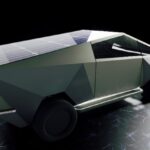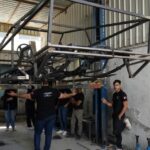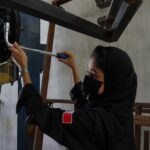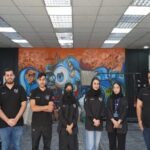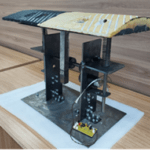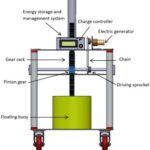Made in GU
GU CyberCar
Project by Dr. Mohammed Abdulrazaq Alshekhly (Associate Professor at Mechanical engineering department)
This research presents the conception, design, development and prototyping of the “GU CybcrCar,” a solar-powered electric vehicle prototype implemented at Gulf University (GU). Inspired by Tesla’s Cybertruck and driven by sustainability goals, the GU Cyber Car leverages advanced technologies such as the Internet of Things (IoT) and solar power to offer a novel approach to sustainable mobility. The vehicle’s design employs a unibody structure and exoskeleton made from stainless steel, reminiscent of the Cybertruck, ensuring robustness and safety. The body shape is optimized for aerodynamics while providing ample surfaces for solar panel integration. The car utilizes high-efficiency solar panels and a state-of-the-art energy storage system to efficiently harness and store solar energy. Moreover, the GU Cyber Car embodies the Internet of Things (IoT) technology principles for enhanced functionality and user convenience. It incorporates a network of sensors and communication modules, facilitating real-time monitoring and control of the vehicle’s system. These IoT features enhance the driving experience and contribute to energy management and overall vehicle safety.
Power Generation Using Speed Brakers For Enhanced Energy
Project by Dr. Mohammed Abdulrazaq Alshekhly (Associate Professor at Mechanical Engineering Department)
This research presents A large amount of energy is wasted by the vehicles on the speed breakers through friction, every time it passes over it. Energy can be produced by using the vehicle weight and speed. So here we propose a smart speed breaker that generates power. The reciprocating motion of the speed breaker is converted into rotary motion using the rack and pinion arrangement. We design a smart speed breaker that can pass vehicles coming from both sides and yet generate energy from it. The system makes use of mechanical assembly with metal sheets with linkages that press down with spring arrangement. The system makes use of the speed breaker press and then uses a rack and pinion arrangement to press down and run generator motor thus generating energy.
Toward Sustainable Smart Cities In Bahrain: A Groundbreaking Approach To Marine Renewable Energy Harnessing Sea Tides And Waves For A Greener Energy Future
Project by Dr. Mohammed Abdulrazaq Alshekhly (Associate Professor at Mechanical Engineering Department)
This research represents a strategic step towards enhancing environmental protection in Bahrain’s aquatic ecosystems. This project introduces a solar-powered boat equipped with a sophisticated oil skimming technology and an integrated pH sensor. The boat’s primary function is to navigate through water bodies, efficiently removing oil and pollutants while simultaneously monitoring the water’s acidity levels. This dual functionality allows for real-time environmental assessment and immediate remediation, which is crucial for maintaining water quality and supporting marine life. By utilizing solar power, the boat operates sustainably, reducing the carbon footprint associated with traditional fuel-powered vessels. This innovative approach not only addresses immediate environmental concerns but also aligns with Bahrain’s broader goals for sustainability and smart city development.
Last Updated on November 19, 2024 @ 10:31:18 am

